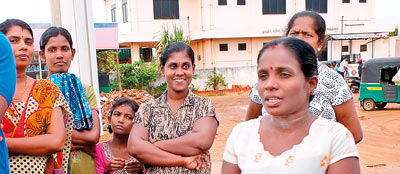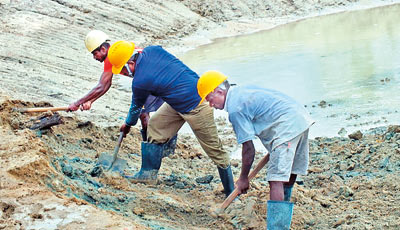75,000 widows and women-led families in Mannar district need to be empowered to be self-sufficient

Mannar residents praise the EU for its work.
MANNAR – The district of Mannar is no different from the rest of Sri Lanka when it comes to the most lucrative, fastest form and no-wait-for-a-government-handout type of development. Since the end of the civil conflict, the speediest development in the country has been in the leisure sector with hotels springing up all over the countryside, with or without a state ‘helping’ hand. Mannar joins the ranks of a number of districts that have ventured into tourism and, across this region one could see a construction boom in tourist hotels in addition to various other buildings. This has caused a shortage of trained construction sector workers.
To fill this shortfall the Mannar Technical College has commenced training construction site supervisors. According to Rukshan Lovell, Programme Officer, EU- Sri Lanka, an MOU was signed by the International Labour Organisation (ILO) and the Department of Technical Education (DTET) for this training programme. The first batch of 18 youth has completed the training course and is now on practical training while the second batch training is on. These and many other developments projects undertaken by the European Union (EU) were exposed to the media some weeks ago during an EU-organised tour of the region.

Rehabilitation of ponds in Mannar
These projects are being implemented by the ILO along with the World Food Organisation (FAO), United Nations Office for Project Services (UNOPS), United Nations Development Programme (UNDP) and the United Nations Children’s Fund (UNICEF). The Sri Lankan Government and other organisations (NGOs) have also contributed to some extent towards these projects. “Promoting Women in Management in the Mannar District” is a project mooted by the IFC and EU to drive regional participation at the Sixth Professional and Career Women Awards 2016 and a function was held at the Mannar Secretariat with M.Y.S. Deshapriya, Government Agent Mannar, Graeme Harris, Senior Operations Officer for Sri Lanka and Maldives, World Bank’s IFC and Sulochana Semera, Founder/Chairperson, Women in Management participating.
Ms. Segera has founded this unique exercise in 2011 and since then highlighted the achievements of a number of Sri Lanka’s top women leaders, enabling them to take the next step in terms of their own personal brand. She has introduced this programme to the North and the East in 2013.
She said that they are promoting women entrepreneurs in the SME sector and in adjudging the prowess of these entrepreneurs they would not consider too much about the financial background of the enterprise, but more on organisational skills, keeping accounts, etc. Mr. Harris indicated that by strengthening women’s roles in the private sector, IFC develops gender-smart solutions that help transform markets. He said that gender- smart solutions include supporting increased access to financial services for women.
IFC estimates over 70 per cent of women-owned SMEs in the formal sector in developing countries are currently un-served or under served by financial institutions. But the vital importance of having more attention to empower women in these areas is the need of the hour was felt when, P.A. Anthony Mark from a local community organisation said there are about 75,000 widows and women-run families and urged the relevant authorities to move to more interior parts of the district and extend these facilities too those widows living in such down-trodden areas. Nevertheless, all the people who reaped the benefits of these projects were full of praise for the good work that benefitted them immensely.
On route to Mannar, the media team was also taken to the Seed Paddy Store and Sales Centre constructed in Puttalam at a cost of Rs. 6.1 million funded by the EU-SDDP (Support to District Development Programme). This seed paddy centre would benefit 1,500 farmer families directly and another 9,000 agri-families. Farmer Anura Senanayake told the Business Times at the centre that they were unable to assess the quality of their seed paddy until this centre was established, which is a positive development. The second project is the “Improvement to School environment and learning achievements” at Shanthipuram Government Tamil School. This project is being implemented with an EU-SDDP fund of Rs 1.5 million and included 17 schools in Vavuniya and 13 schools in Mannar.
The third project the media observed was the ‘Construction Site Supervisor’ training programme at the Mannar Technical College implemented by the ILO and the Mannar Technical College. Funds allocated to this project totaled Rs.4.8 million. Most of the youth in the area are still suffering from the trauma of the war. One girl told the Business Times that when she was very young she witnessed her mother and father being shot dead. Another said their entire life in their remote villages was spent running from bunker to bunker or any shelter every time there were shelling and bombings. Insufficient political influence or parents reluctant to allow them to work outside their region fearing communal tensions will erupt at any time, is their biggest hurdle in getting a job.
“We may have all the paper qualifications required for the job but political influence to get jobs plays a bigger role,” one young girl said, adding that parents are also reluctant to see them work in Colombo or elsewhere for the reasons given above. The other project is the “Revival and Strengthening of fish fingerling nursery at Parapankandal, Mannar funded by EU-SDDP (FAO) at a cost of Rs. 2.3 million which is implemented by the National Aquatic Develoment Authority and the Sirukkulam Village Fisheries Society of Yodha Wewa (Giant Tank). This is a programme of the FAO under poverty reduction. The hatchery would nurture around one million fingerlings for about 1 ½ months before they are released to the tank. They would grow in the tank for around six months, according to J.M.A. Sudarshan, Regional Project Coordinator, FAO.
He said that around 700 families live on the fish caught in the tank. There are 12 more tanks around the area and these fingerlings are introduced to them too. Mr. Sudarshan said that a considerable amount of fish is caught from these tanks and around half of the catches are sold locally and the balance is transported outside the province for sale. He said that there are ambitious plans to introduce such fish like sea bass (Moda) for export purposes. Covering the visit was difficult due to intermittent rain. Some of the fish-farming families gathered there thanked the FAO for this project on which these families make a living. The final project the media team visited was the rehabilitation of ponds in Mannar at a cost of Rs. 200 million to prevent sea water inland and to flow access rain water into the sea.


